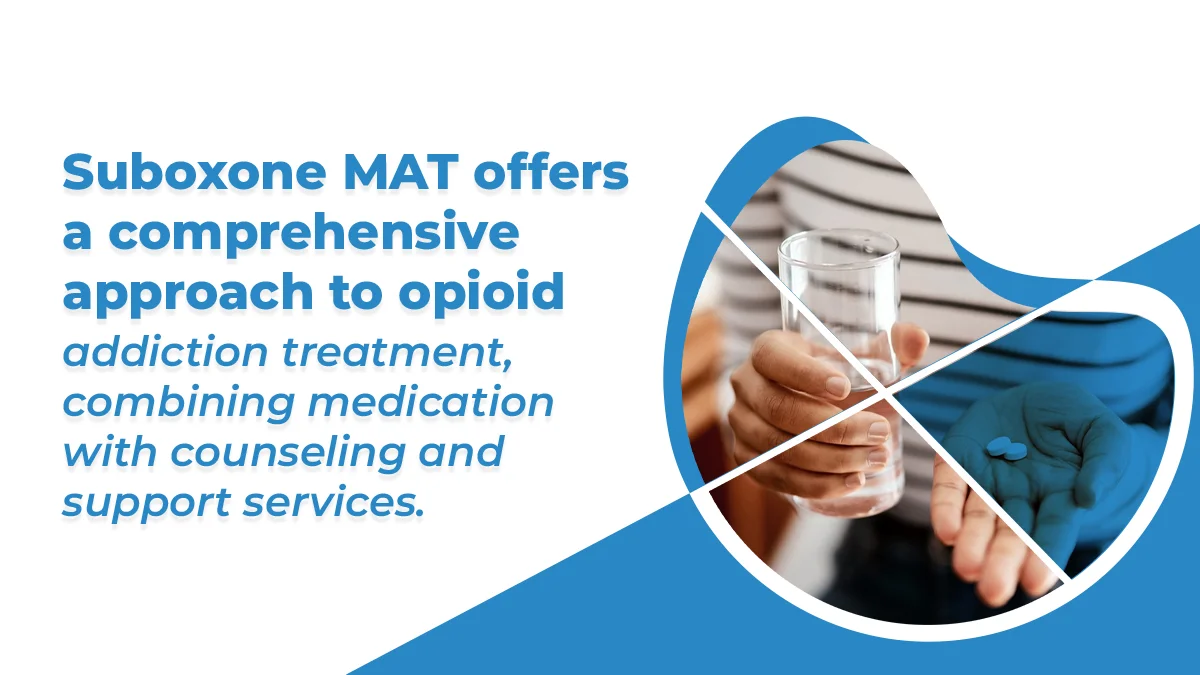
Lyrica With Suboxone: Risks And Safe Practices
The Recovery Team-Newton explores whether taking Lyrica with Suboxone is safe. Explore potential risks and guidelines

In the fight against opioid addiction, Suboxone medication-assisted treatment (MAT) has emerged as a promising solution. This method involves the combination of medication with counseling and therapy to provide comprehensive care to opioid-dependent patients. This article explores the application of Suboxone medication-assisted treatment and its effectiveness.
Suboxone plays a pivotal role in medication-assisted treatment (MAT), offering a comprehensive approach to recovery. This article covers:
The Recovery Team-Newton offers a range of services to treat drug and alcohol use disorders (AUDs). Contact (508) 978-2772 for detailed information.
Suboxone is a medication approved by the United States Food and Drug Administration (FDA) for the treatment of opioid use disorder (OUD). It’s made up of two active ingredients: buprenorphine and naloxone.
Buprenorphine, a partial opioid agonist, helps reduce cravings and withdrawal symptoms without producing the intense high associated with full opioids like methadone and heroin. Naloxone, an opioid antagonist, blocks the effects of opioids and prevents misuse of the medication.
Suboxone functions by attaching to the opioid receptors in the brain. Buprenorphine activates these receptors but to a much lesser degree, providing enough euphoria to alleviate withdrawal and cravings. Naloxone remains inactive when Suboxone is taken as prescribed. However, if Suboxone is misused, such as by injection, naloxone becomes active and can precipitate withdrawal symptoms, discouraging abuse.
Suboxone is often used as a key part of medication-assisted treatment (MAT) programs for substance use disorders (SUDs) like opioid addiction. Along with counseling and therapy, MAT can significantly improve the chances of recovery by addressing both the physical and psychological aspects of addiction. It’s an effective tool in helping people regain control of their lives and move towards a healthier, drug-free future.
Suboxone treatment is a structured process aimed at helping individuals overcome opioid dependence and addiction. Here’s a breakdown of its key phases:
The journey towards Suboxone MAT commences with a thorough assessment and diagnosis by healthcare professionals, such as doctors. During this phase, patients are evaluated to determine the severity of their opioid dependency and whether Suboxone is a suitable treatment option.
Following assessment, patients enter the induction phase. Here, they initiate Suboxone therapy under medical supervision. This phase involves the careful administration of Suboxone to mitigate withdrawal symptoms and cravings while ensuring patient safety.
Once individuals respond positively to Suboxone and experience reduced cravings and withdrawal symptoms, they progress to the stabilization phase. Here, dosage adjustments may occur to achieve optimal therapeutic benefits and maintain patient health stability.
The maintenance phase marks a crucial period in Suboxone treatment, where patients sustain their progress and work towards long-term recovery. Regular medical appointments and addiction counseling sessions support individuals in maintaining sobriety and addressing any challenges that may arise.
In the final phase, tapering off Suboxone is carefully managed under medical supervision. The dosage of prescribed medication is gradually reduced to lessen withdrawal symptoms. Close monitoring and support are provided throughout this process to ensure a successful transition to sobriety.
In summary, suboxone MAT involves several phases, each tailored to address the unique needs of individuals undergoing the treatment of addiction to opioids.
In Suboxone MAT, therapy and support services play a vital role in aiding those affected on their journey to recovery. Here’s a breakdown of the essential components:
Various types of behavioral therapies are utilized in Suboxone MAT to address the underlying factors contributing to substance abuse. These may include cognitive behavioral therapy (CBT), which focuses on altering harmful thought patterns and behaviors, and motivational interviewing (MI), which helps individuals explore their motivations for change and set achievable goals.
In addition to formal therapy sessions, integrating support systems like support groups, family therapy, and peer support networks can provide invaluable encouragement and guidance. These support systems offer individuals opportunities to connect with others who understand their experiences and provide ongoing encouragement throughout their recovery journey.
By addressing both psychological and social aspects of addiction, these services contribute significantly to long-term success in the treatment process.
Suboxone MAT, an effective opioid treatment program, can bring both common and rare side effects. However, with proper management strategies, individuals can navigate these effects effectively.
Suboxone may cause several common side effects, including:
These side effects can be problematic but are generally manageable with the right strategies and support.
While uncommon, Suboxone can also lead to rare but serious side effects, such as:
Although rare, these side effects necessitate immediate medical attention if experienced.
To manage the side effects of Suboxone effectively, consider the following lifestyle changes and strategies:
By implementing these strategies and staying vigilant, individuals undergoing Suboxone MAT can minimize the impact of adverse effects on their daily lives and treatment progress.
MAT treatment typically involves three phases: induction, stabilization, and maintenance. During induction, medication is initiated to manage withdrawal symptoms. Stabilization follows, focusing on adjusting dosage to achieve balance and reduce cravings.
Lastly, maintenance maintains the established progress, often combined with substance abuse counseling and support. These phases ensure a structured approach to managing addiction, promoting recovery and long-term well-being.
Suboxone is a medication used in MAT for the treatment of opioid dependence and addiction. It contains two drugs: buprenorphine and naloxone. Buprenorphine reduces symptoms of withdrawal and cravings, while naloxone helps prevent abuse by blocking the effects of opioids. Taken as prescribed, Suboxone helps individuals gradually reduce dependence on opioids, making it easier to focus on recovery and avoid relapse. It’s an effective tool in MAT for promoting long-term sobriety.
While undergoing a Suboxone medication-assisted treatment program, it’s crucial to follow the prescribed dosage strictly. Avoid combining Suboxone with alcohol or other drugs, as it can lead to dangerous interactions. Inform your healthcare provider about any medicines or supplements you’re taking. Attend regular appointments for monitoring and adjustment of treatment. Adhering to these precautions maximizes the effectiveness of treatment and ensures safety during recovery.
The Recovery Team-Newton is here to help you break free from the grips of substance use disorder (SUD). Our day treatment program offers a supportive space where you can find the powerful tools and guidance you need to achieve long-term sobriety.
With our medication-assisted treatment (MAT) program, we address both the physical and psychological aspects of addiction. By combining the use of medications with therapy and support services, we tailor our approach to suit the needs of each patient. Additionally, our dual diagnosis program provides specialized care for those battling both addiction and mental illnesses like anxiety and depression.
Don’t wait any longer to take the first step towards a brighter future. Contact us today at (508) 978-2772 to learn more about how our team of medical professionals can support you on your journey to recovery.

The Recovery Team-Newton explores whether taking Lyrica with Suboxone is safe. Explore potential risks and guidelines

Learn about Suboxone injection side effects and explore recovery solutions in this guide by The Recovery Team-Newton.